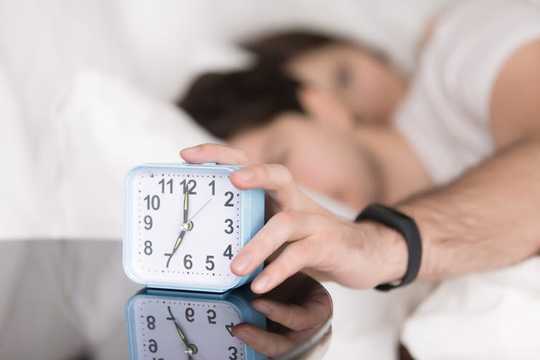 Wearable fitness trackers have less accuracy when used in certain ways. bogdankosanovic/E+ via Getty Images Katie Siek, Indiana University
Wearable fitness trackers have less accuracy when used in certain ways. bogdankosanovic/E+ via Getty Images Katie Siek, Indiana University
January is a time when many people make resolutions – and then break them. Almost 60% of Americans will resolve to exercise more, but fewer than 10% will stick with their resolution. A key to keeping resolutions is ensuring they are measurable, and a simple way to track activity is through a wearable smartwatch or fitness tracker. Indeed, almost one in five adults has used a fitness tracker.
Wearable fitness trackers can also help improve medical care by providing insights into physical activity, heart rate, location and sleep patterns. My research team uses wearable fitness tracker data with smart home sensors to help older adults live safely and independently. We also study wearable fitness tracker data along with electronic medical records and genomic data to investigate the causes of gestational diabetes. Many other researchers utilize wearable fitness trackers to better understand how lifestyles can impact health.
Unfortunately, I’ve found in my health informatics research that wearable devices may not give all the credit their users deserve, and in some cases, users may want to consider how secure and private their data is.
Giving credit when it’s due
People who use fitness trackers have been frustrated with how they get “credit” for their activities, which drives some users to abandon fitness trackers. In my research team’s work, we find that people who have limited arm movement report that fitness trackers are not accurately recording their activities. This can happen as well with those who do not have traditional gaits because they may shuffle.
Get The Latest By Email
The lack of credit is especially obvious when people are walking but keeping their arms still – such as pushing a stroller or walking while holding an infant. New mothers also report accuracy issues with respect to their sleep patterns. When they wake up multiple times a night, the next morning the device will show them as “lightly sleeping.” This is frustrating when the new mother wants to use this data to negotiate with her partner on child care because a device may credit the mother with more sleep than she actually gets.
 Were you ‘lightly sleeping’ or did you wake up multiple times? fizkes/iStock via Getty Images
Were you ‘lightly sleeping’ or did you wake up multiple times? fizkes/iStock via Getty Images
These inaccuracies make sense from a technical point of view. When people keep their wrists still, as in pushing a stroller, the wrist is not changing directions. Thus, the software cannot detect changes in movement from the accelerometer sensor on a wrist tracker which is looking for changes in up-down, forward-backward and side-to-side movements. Researchers have also shown that 500 or fewer steps can be recorded without wearing the device, reflecting how devices can over count activity sometimes. In the case of detecting sleep, most people do not wake up multiple times a night, so the algorithms used by wearable devices may throw these short bursts of movement away.
The companies that make these wearable devices have significant intellectual property involved in detecting these movements and then using algorithms to decide how much people are moving or sleeping, so these algorithms are not shared publicly. There currently do not exist any mechanisms to give feedback on what was detected. Imagine if a person could push a button and tell a wearable fitness device, “I did wake up three times tonight!”
Since people are not getting the credit they deserve for some of their activities, I am concerned about what type of lifestyle data we researchers can accurately assess from a commodity wearable for our health research. In computing, there is a saying, “Garbage in, garbage out.” If wearable fitness trackers are putting inaccurate step and sleep data into the algorithms that quantify our activities, then people will be making health-related decisions based on inaccurate data.
Who has the data?
Typically, consumers assess how much “credit” they are getting from a fitness tracker by transferring the data to an app. Most people likely assume that when people transfer the data to the app, the data is not shared widely. Users may assume, for instance, that they can see the data, people they shared data with can view it and the company who has the device and app can see the data. But this is only part of the story.
A company, however, could change its terms of service – which, studies have shown, people have difficulty understanding – and decide to make this health data available to third parties. For example, wearable fitness data could be sold to help our employers understand our fitness and productivity or insurance companies to assist with or deny health coverage. Although there’s no evidence of this practice being done, I believe consumers would do well to be aware that it is a possibility in the future.
About the Author
Katie Siek, Associate Professor of Informatics, Indiana University
This article is republished from The Conversation under a Creative Commons license. Read the original article.
books_exercise










